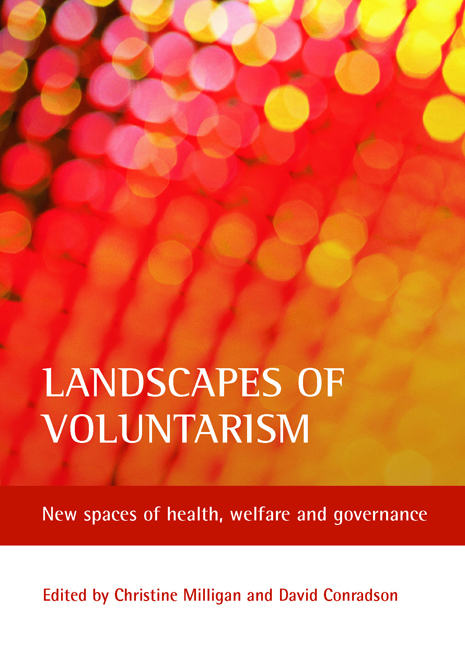Book contents
- Frontmatter
- Contents
- List of tables, figures, maps and plates
- Notes on contributors
- Foreword: Beyond the shadow state?
- one Contemporary landscapes of welfare: the ‘voluntary turn’?
- two A ‘new institutional fix’? The ‘community turn’ and the changing role of the voluntary sector
- three Renewal or relocation? Social welfare, voluntarism and the city
- four Voluntarism and new forms of governance in rural communities
- five New times, new relationships: mental health, primary care and public health in New Zealand
- six Informal and voluntary care in Canada: caught in the Act?
- seven Competition, adaptation and resistance: (re)forming health organisations in New Zealand’s third sector
- eight The difference of voluntarism: the place of voluntary sector care homes for older Jewish people in the United Kingdom
- nine Values, practices and strategic divestment: Christian social service organisations in New Zealand
- ten Faith-based organisations and welfare provision in Northern Ireland and North America: whose agenda?
- eleven Government restructuring and settlement agencies in Vancouver: bringing advocacy back in
- twelve Developing voluntary community spaces and Ethnicity in Sydney, Australia
- thirteen The voluntary spaces of charity shops: workplaces or domestic spaces?
- fourteen The changing landscape of voluntary sector counselling in Scotland
- fifteen Volunteering, geography and welfare: a multilevel investigation of geographical variations in voluntary action
- sixteen Reflections on landscapes of voluntarism
- Index
six - Informal and voluntary care in Canada: caught in the Act?
Published online by Cambridge University Press: 15 January 2022
- Frontmatter
- Contents
- List of tables, figures, maps and plates
- Notes on contributors
- Foreword: Beyond the shadow state?
- one Contemporary landscapes of welfare: the ‘voluntary turn’?
- two A ‘new institutional fix’? The ‘community turn’ and the changing role of the voluntary sector
- three Renewal or relocation? Social welfare, voluntarism and the city
- four Voluntarism and new forms of governance in rural communities
- five New times, new relationships: mental health, primary care and public health in New Zealand
- six Informal and voluntary care in Canada: caught in the Act?
- seven Competition, adaptation and resistance: (re)forming health organisations in New Zealand’s third sector
- eight The difference of voluntarism: the place of voluntary sector care homes for older Jewish people in the United Kingdom
- nine Values, practices and strategic divestment: Christian social service organisations in New Zealand
- ten Faith-based organisations and welfare provision in Northern Ireland and North America: whose agenda?
- eleven Government restructuring and settlement agencies in Vancouver: bringing advocacy back in
- twelve Developing voluntary community spaces and Ethnicity in Sydney, Australia
- thirteen The voluntary spaces of charity shops: workplaces or domestic spaces?
- fourteen The changing landscape of voluntary sector counselling in Scotland
- fifteen Volunteering, geography and welfare: a multilevel investigation of geographical variations in voluntary action
- sixteen Reflections on landscapes of voluntarism
- Index
Summary
Introduction
Contemporary Western societies are undergoing social, political and economic change as they come to terms with major shifts in the global economy. The adjustment process has been characterised in part by national policies promoting rapid and far-reaching restructuring of economies and societies (Pinch, 1997). Within this context, governments have sought to reconfigure their responsibilities with respect to the provision of public services (Cope and Gilbert, 2001). Although experiences vary considerably within and between nation states, the attendant reworking of central–local relations and public–private responsibilities has facilitated shifts in the nature of both local governance and the organisation and delivery of healthcare services (Lewis and Moran, 1998; Joseph and Knight, 1999). These transformations have had important implications for voluntary organisations, community groups and volunteers, particularly given the challenges these actors face in reconciling increasing demands for care in the home and community with processes of statutory retrenchment and the broader unevenness of healthcare provision (Kearns and Joseph, 1997; Milligan, 1998; Wiles, 2003a).
The healthcare sector provides a particularly important example of the dynamic and complex interlinkages between processes of restructuring, shifting forms of governance and voluntarism. In response to the fiscal crisis of the state, health restructuring during the 1980s and 1990s generally involved the application of deregulatory principles to particular services and institutions (Pinch, 1989; Barnett, 2000). This ‘public service restructuring’, as it is generally referred to in human geography and the social sciences, can be seen as an orchestrated set of policies, measures and institutional actions (for example, devolution, privatisation, rationalisation) used by governments to reduce their roles in the funding or delivery of healthcare services (Pinch, 1997). Implicit in this process has been the renegotiation of the roles and responsibilities of the state, civil society and marketplace (Moran, 1999). A common result has been increasing interdependence of the public, private and informal and voluntary sectors in the provision of healthcare services, especially at the local level (Milligan, 2000).
A central process in the changing nature of ‘local governance’ (Goodwin and Painter, 1996) has been a move away from state-led, hierarchical coordination of public services towards a greater emphasis on community-based providers. In the health sector, this local community has often been understood to include family, friends and neighbours, all of whom are now expected to play active and direct roles in the delivery of healthcare services (for example, Crampton et al, 2001).
- Type
- Chapter
- Information
- Landscapes of VoluntarismNew Spaces of Health, Welfare and Governance, pp. 91 - 114Publisher: Bristol University PressPrint publication year: 2006



